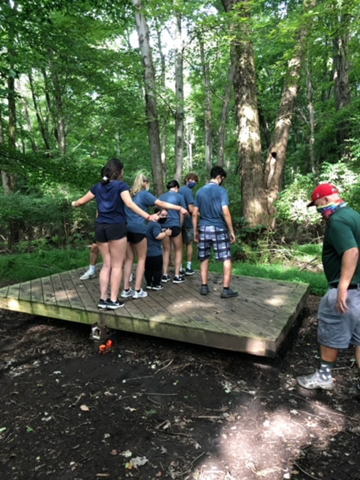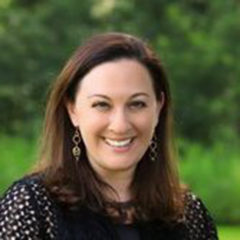Imagine a giant wooden seesaw. Not the kind you played on as a kid, but instead, one that would hold you and 24 other grown people, all standing at once. The goal is for everyone in the group to step up onto the see-saw, stay standing on it, and for the see-saw to always remain balanced, never touching the ground. If you step on, and the see-saw touches the ground, everyone must come off and start again. At first glance, the task seems doable or even easy, but after one person steps on and finds their balance, the next person steps up and almost always makes it touch the ground. Others who are observing and waiting for their turn inevitably start shouting out suggestions and possible strategies. They tell people where to stand, how to place their feet, when to step on, and how to bend their knees.
If this sounds a bit strange and tricky, you’re right! Now, imagine doing this with a group you have just met. That is precisely the way teens in the Wexner Service Corps begin their year together. But ultimately, it is this activity that forms the foundation of trust and an invitation to vulnerability that is so critical to our program and every working relationship.
Each year, we select a special and diverse group of local (Columbus, Ohio) high school juniors and seniors who commit to one year of community service and Jewish learning. These are teens who are often over-programmed, don’t have enough time to sleep at night, are on the brink of major life decisions, and living through an incredibly challenging and unique moment in time. Yet, they display their passion for Jewish learning and service by making this program another fixed part of their many year-long commitments.
When the pandemic began in 2020, and we determined that “virtual service” could be viable, and we developed and explored it with WSC teens. One of the major opportunities faced was how to build trust without being physically on site together. In hindsight, it’s amazing to reflect on how many different organizations and groups were able to find ways not just to try to connect people to one another, but to actually succeed in making people feel connected to one another without sharing the same physical space.
At that time, for Wexner Service Corps teens, that meant following a zoom call protocol that encouraged vulnerability naturally. When teens would first sign on, we would begin our session with personal prompts that needed short answers in the chat. Next, teens would be invited to post ideas or answers often anonymously using a digital tool called a “padlet.” During our learning, teens would be placed into smaller breakout groups for a more intimate and safer setting to share thoughts. And finally, as a full group, teens were invited to unmute to share their voices aloud. This process was an unnamed, organic way to build trust with one another. By allowing participants to share only what felt comfortable, while consistently modeling vulnerability and making available a range of opportunities to be vulnerable, comfort and connection increased at each step.

This online practice worked well for creating a safe space to learn, grow, and challenge one another. Even once our service and learning work resumed in person, we adapted these pieces and expanded them as we relearned what trust looked like in relationships when everyone was able to be physically present. Throughout our year, we begin each service event with a range of ice breakers that are meant to help the teens step beyond their comfort zones, learn things about themselves, get to know one another, try new things, and develop leadership skills. These ice breakers are a fun and low-stakes way of encouraging authentic sharing, reflection and vulnerability among the teens, and after these opening warm-up activities, our Jewish learning is often richer, and our conversations both more fruitful and meaningful.
In fact, in the Wexner Service Corps, we constantly share our thoughts, opinions, and ideas. We invite differences and disagreements. We encourage deep, active listening – we strive to find commonalities and shared passions. We experience things together, get our hands dirty, clean up, do the hard work, and support one another. While we cannot force teens (or anyone) to trust each other or insist that they demonstrate vulnerability, I continue to model it and provide opportunities to develop it.
May each of us find the courage to step out onto life’s seesaw, and keep coming back even – especially – when the group loses its balance, doing our best to find new and creative ways to support others as they do the same.


